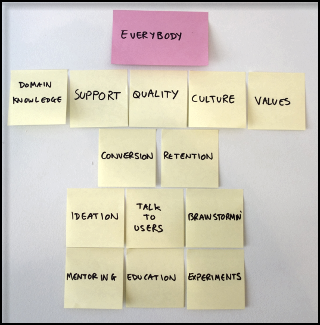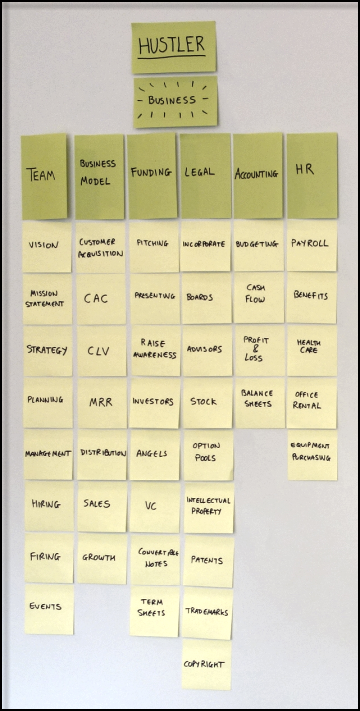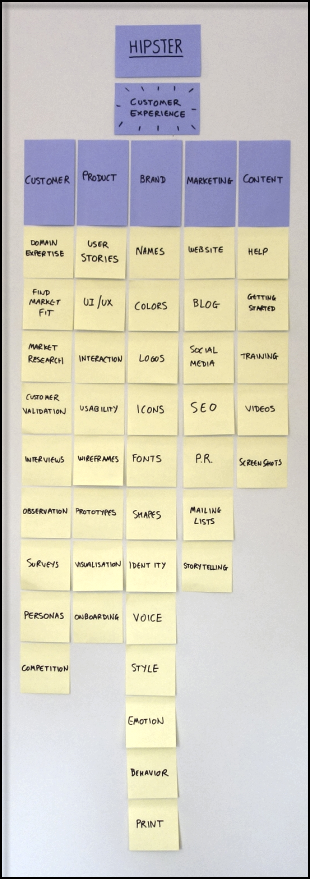Software Startup Roles

This year I plan to (co)-found a new software startup company.
While I am confident about the technical aspects, I am less sure about the business, sales, and marketing components. So it will be critical to have co-founders with complementary skills in those areas.
Of course, having great co-founders doesn’t divest me of the responsibility to understand those areas. So recently I started to make a list of all of the things that a software startup must think about, make decisions upon, and act on, in order to succeed.
Naturally, being a developer, my list started with the technology - the services we would need, the platform we would choose, the development process we would implement, the infrastructure we would put in place…
My list grew long
Then I started to think outside of my area of expertise, and consider the bigger picture, customer validation, market research, competitive analysis, branding, funding, legal, accounting…
My list grew much longer
I am a natural organizer, so once I have a long list I want to categorize and organize it, and the obvious starting point was to break it down into the classic startup co-founder roles…
The Startup Trifecta
Within the startup community there is a, somewhat mythical, ‘ideal’ startup team. Three founders with complementary skills. These are sometimes described as the Hustler, the Hipster, and the Hacker. These are not derogatory terms, they are convenient stereotypes to help frame a simplified conversation.
Alternative ways to think of the three founders include:
| Hustler | Hipster | Hacker | |
|---|---|---|---|
| Department | Sales | Marketing | Engineering |
| Focus | Business | Customer | Technology |
| Skills | BizDev | Design | Development |
| Title | CEO, COO | CMO, CPO | CTO |
You can find many references to the HHH founding team:
- The Dream Team: Hipster, Hacker, and Hustler
- Hackers, hipsters, and hustlers - the dream team for innovation
- Which role is yours: Hustler, Hack, Hipster, or Hacker
- 3H’s all startups need in a team - Hustler, Hipster, Hacker
- Are three founders one too many?
The following slide from a presentation by startup simple has a nice summary:
The Founders Tasks
So, getting back to my list.
We can identify a primary responsibility for each founder:
- Hustler - responsible for the business.
- Hipster - responsible for the customer experience.
- Hacker - responsible for the platform.
We can then break down those primary responsibilities into (rough) categories:
- HUSTLER
- TEAM
- BUSINESS MODEL
- FUNDING
- LEGAL
- ACCOUNTING
- HR
- HIPSTER
- CUSTOMER
- PRODUCT
- BRAND
- MARKETING
- CONTENT
- HACKER
- SERVICES
- TECHNOLOGY
- DATA
- PROCESS
- INFRASTRUCTURE
These are not intended to create silos, there will be overlap, some topics are large, some are small, there will be topics that don’t fit naturally into a single category, and the categorization itself is subjective and will depend on individual teams (e.g. perhaps MARKETING is really a responsibility for the hustler). This article simply represents one possible way to get some structure around the huge amount of work ahead for your startup.
It is important to note that there are some topics that are far too critical to be left to the responsibility of just a single founder. These topics are everybodys responsibility, at all times, and will eventually be an indication of your startup values.
- EVERYONE
- DOMAIN KNOWLEDGE
- SUPPORT
- QUALITY
- CULTURE
- VALUES
- CONVERSION & RETENTION
- TALKING TO USERS
- IDEATION & BRAINSTORMING
- MENTORING
And finally we can now categorize our big list by putting each of the topics we identified during brainstorming into an appropriate category:
Now that it’s organized, it doesn’t look quite so large and overwhelming!
What everybody should care about

We already noted that there are some topics that are far too critical to be left to the responsibility of just a single founder. These topics are everybody’s responsibility, at all times, and will eventually be an indication of your startup values.
Your topics will vary, mine include:
-
DOMAIN KNOWLEDGE - everybody on the team needs to be comfortable with your target domain.
-
TALK TO USERS - much of what you learn about a domain comes from actual conversation with users.
-
SUPPORT - make customer support everybodys responsibility.
-
QUALITY - and the same with QA.
-
CULTURE - comes from people, top-down from the founders actions, and bottom-up from the employees behavior.
-
VALUES - must come from the entire team, not just the founders.
-
CONVERSION, RETENTION - how to gain users, and how to keep them - a fundamental.
-
IDEATION, BRAINSTORMING, EXPERIMENTS - creativity drives innovation.
-
MENTORING, EDUCATION - you want a team that learns and grows with the business.

The Hustler
The hustler’s responsibility is to build a great business. They must be strategic, create a vision and plan accordingly.
They are team builders responsible for gathering founders, partners, advisors, investors, and employees. They take ultimate responsibility for hiring and firing.
They must figure out how to acquire customers, find a great business model, prove customer value, and build out a sales pipeline.
They must track core business metrics, customer acquisition costs, customer lifetime value, and monthly recurring revenue.
A large part of the hustler’s work is raising awareness and raising money - whether bootstrapping, angel funding, or VC - funding is critical to the companies survival.
The hustler must execute (or outsource) the logistics of running a business - incorporating, legal, IP, accounting, budgeting, HR, offices, equipment.
The hustler is responsible for the growth of the company.

The Hipster
The hipster’s responsibility is to build a great customer experience.
They must become domain experts and learn everything there is to know about their users via interviews, observation, surveys, and personae.
They must understand the competition and the status quo. They must find market fit. They must validate that the product actually solves the customers problem.
The hipster designs every interaction point with the user.
They identify user stories, design UI and UX, construct wireframes, design workflows and interactions, build prototypes, and perform usability tests.
They define the brand, its style, voice, and the emotions we want to convey, the colors, shapes, names, icons, logos, fonts, videos, screenshots and other content.
The hipster is responsible for marketing, building a website, a blog, social media, and press.
The hipster is responsible for customer success.

The Hacker
The hacker’s responsibility is to build a great platform.
They must work with external services to setup infrastructure for domain names, dns, email, sms, source control, continuous integration, hosting, project management, bug tracking, collaboration tools, monitoring and measuring services, analytics, and billing services.
They must choose technology wisely. A startup must be agile and flexible and the platform must support that flexibility. Which programming languages, which frameworks and libraries, tools, web servers, database servers, message brokers, and key/value stores.
The hacker must construct a data model that accurately reflects the target domain. They must ensure adequate data storage, backups, migration, archiving, replication, and data analysis.
They must put into place a suitable development process. An agile, iterative, test driven, data driven process that fits the culture of the business. They must perform code reviews and code analysis. They must document, teach and mentor others.
They must find the balance between short-term features and long-term infrastructure. They must take on technical debt carefully and take the time to refactor when necessary.
The hacker must build infrastructure in addition to customer facing features, provisioning, performance, scalability, security, redundancy, authentication, authorization, logging, caching, notifications, API’s & integrations, account membership, session management, error handling, internationalization & localization, feature flags & A/B testing.
They must code, maintain, test, document, deploy, and operate. They must automate everything.
The hacker is responsible for actually building stuff.
SUMMARY
So that is my list. These are the things that I need to think about as I (and my co-founders) create our startup in the coming year.
It’s only a guideline, an organizing tool. The categories are rough and overlap (and subject to change), some topics are large, some are small, some topics don’t fit naturally into a single category, and some are perhaps badly named - your list must be your own.


